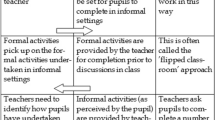Abstract
Technology-based learning environments have been created based on learning content and available technologies. Creating technology-based learning environments that are content specific is a challenge many teachers have faced. The available technologies teachers have been restricted based on school resources and if the technology can be paired with the learning content. Furthermore, student abilities may have caused restriction the technologies teachers have to choose from. Teachers have been under pressure to choose technologies that contribute to learning. As technology is an affordance for assisting students in learning, examining technology-based learning environments is needed for assisting teachers with successful integration. This literature review will examine technology-based mathematics classrooms. The purpose of the literature review is to propose an algorithmic device that chooses technology based on the needs of learners in mathematics classrooms. The algorithmic device will serve as the extension of teachers’ minds for choosing technology, allowing teachers to focus their knowledge on developing students’ knowledge. Supporting theories are discussed on technology-based mathematics classrooms, algorithmic devices, and cognitive extension. Future research should investigate the effects of an algorithmic device used to help with technology integration on teacher knowledge and student achievement. Implications and recommendations are discussed for the proposed algorithmic device and for future research on the integration of the algorithmic device.
Access this chapter
Tax calculation will be finalised at checkout
Purchases are for personal use only
Similar content being viewed by others
References
Anthony, A., Clark, L.: Examining dilemmas of practice associated with the integration of technology into mathematics classrooms serving urban students. Urban Educ. 46(6), 1300–1331 (2011). https://doi.org/10.1177/0042085911416015
Baumert, J., Kunter, M., Blum, W., Brunner, M., Voss, T., Jordan, A., Klusmann, U., Krauss, S., Neubrand, M., Tsai, Y.: Teachers’ mathematical knowledge, cognitive activation in the classroom, and student progress. Am. Educ. Res. J. 47(1), 133–180 (2010). https://www.jstor.org/stable/40645421
Chapman, O.: Investigating teachers’ knowledge for teaching mathematics. J. Math. Teacher Educ. 16, 237–243 (2013). https://doi.org/10.1007/s10857-013-9247-2
Chapman, O.: Understanding and enhancing teachers’ knowledge for teaching mathematics. J. Math. Teacher Educ. 20(4), 303–307 (2017). https://doi.org/10.1007/s10857-017-9377-z
Clark, A., Chalmers, D.: The extended mind. Analysis 58, 7–19 (1998). https://doi.org/10.1093/analys/58.1.7
Danielsson, A.T., Berge, M., Lidar, M.: Knowledge and power in the technology classroom: a framework for studying teachers and students in action. Cult. Sci. Edu. 13(1), 163–184 (2017). https://doi.org/10.1007/s11422-016-9782-0
Dingman, S., Teuscher, D., Newton, J., Kasmer, L.: Common mathematics standards in the United States: a comparison of K-8 state and common core standards. Elem. Sch. J. 113(4), 541–564 (2013). https://www.jstor.org/stable/10.1086/669939. Accessed
Drijvers, P., Doorman, M., Boon, P., Reed, H., Gravemeijer, K.: The teacher and the tool: instrumental orchestrations in the technology-rich mathematics classroom. Educ. Stud. Math. 75, 213–234 (2010). https://doi.org/10.1007/s10649-010-9254-5
Flores, R., Koontz, E., Inan, F., Alagic, M.: Multiple representation instruction first versus traditional algorithmic instruction: impact in middle school mathematics. Educ. Stud. Math. 89, 267–281 (2015). https://doi.org/10.1007/s10649-015-9597-z
Gabriele, A., Joram, E., Park, K.: Elementary mathematics teachers’ judgment accuracy and calibration accuracy: do they predict students’ mathematics achievement outcomes? Learn. Instr. 45, 49–60 (2016). https://doi.org/10.1016/j.learninstruc.2016.06.008
Greif, H.: What is the extension of the extended mind? Synthese 194, 4311–4336 (2017). https://doi.org/10.1007/s11229-015-0799-9
Guzman, A., Nussbaum, M.: Teaching competencies for technology integration in the classroom. J. Comput. Assist. Learn. 25, 453–469 (2009). https://doi.org/10.1111/j.1365-2729.2009.00322.x
Hill, H.: Connections between teachers’ knowledge of students, instruction, and achievement outcomes. Am. Educ. Res. J. 55(5), 1076–1112 (2018). https://doi.org/10.3102/0002831218769614
Hill, H., Rowan, B., Loewenberg Ball, D.: Effects of teachers’ mathematical knowledge for teaching on student achievement. Am. Educ. Res. J. 42(2), 371–406 (2005). https://www.jstor.org/stable/3699380. Accessed
Hill, H., Schilling, S., Loewenberg Ball, D.: Developing measures of teachers’ mathematics knowledge for teaching. Elem. Sch. J. 105(1), 11–30 (2004). https://www.jstor.org/stable/10.1086/428763
Jonsson, B., Norqvist, M., Liljekvist, Y., Lithner, J.: Learning mathematics through algorithmic and creative reasoning. J. Math. Behav. 36, 20–32 (2014). https://doi.org/10.1016/j.jmathb.2014.08.003
Koh, J., Chai, C., Tay, L.: TPAC-in-action: unpacking the contextual influences of teachers’ construction of technological pedagogical content knowledge (TPACK). Comput. Educ. 78, 20–29 (2014). https://doi.org/10.1016/j.compedu.2014.04.022
Mishra, P., Koehler, M.J.: Technological pedagogical content knowledge: a framework for teacher knowledge. Teachers Coll. Rec. 108(6), 1017–1054 (2006). https://www.learntechlib.org/p/99246/. Accessed 11 April 2020
National Council of Teachers of Mathematics: Curriculum and Evaluation Standards for School Mathematics. NCTM, Reston (1989)
National Council of Teachers of Mathematics (NCTM): Principles and Standards for School Mathematics. NCTM, Reston (2000)
Ottmar, E., Rimm-Kaufman, S., Larsen, R., Berry, R.: Mathematical knowledge for teaching, standards-based mathematics teaching practices, and student achievement in the context of the responsive classroom approach. Am. Educ. Res. J. 52(4), 787–821 (2015). https://doi.org/10.3102/0002831215579484
Ozel, S., Yetkiner, Z., Capraro, R.: Technology in K-12 mathematics classrooms. Sch. Sci. Math. 108(2), 80–85 (2008). https://doi.org/10.1111/j.1949-8594.2008.tb17807.x
Parsons, T.D.: Neuroethics in educational technology: Keeping the brain in mind when developing frameworks for ethical decision-making. In: Parsons, T., Lin, L., Cockerham, D. (eds.) Mind, Brain, and Technology: How People Learn in the Age of New Technologies, pp. 195–210. Springer, New York (2019)
Pittman, T., Gaines, T.: Technology integration in third, fourth and fifth grade classrooms in a Florida school district. Educ. Tech. Res. Dev. 63(4), 539–554 (2015). https://doi.org/10.1007/s11423-015-9391-8
Roberts, T.: You do the maths: rules, extension, and cognitive responsibility. Philos. Explor. 15(2), 133–145 (2012). https://doi.org/10.1080/13869795.2012.670724
Shulman, L.S.: Those who understand: knowledge growth in teaching. Educ. Res. 15(2), 4–14 (1986)
Yamashita, K., Fujioka, R., Kogure, S., Noguchi, Y., Konishi, T., Itoh, Y.: Practices of algorithm education based on discovery learning using a program visualization system. Res. Pract. Technol. Enhanced Learn. 11(1), 1–19 (2016). https://doi.org/10.1186/s41039-016-0041-5
Author information
Authors and Affiliations
Corresponding author
Editor information
Editors and Affiliations
Rights and permissions
Copyright information
© 2021 Springer Nature Switzerland AG
About this paper
Cite this paper
Lankford, B. (2021). Creating Technology-Based Mathematics Learning Environments: Extension of Teacher Knowledge and Student Achievement. In: Arai, K., Kapoor, S., Bhatia, R. (eds) Proceedings of the Future Technologies Conference (FTC) 2020, Volume 1. FTC 2020. Advances in Intelligent Systems and Computing, vol 1288. Springer, Cham. https://doi.org/10.1007/978-3-030-63128-4_65
Download citation
DOI: https://doi.org/10.1007/978-3-030-63128-4_65
Published:
Publisher Name: Springer, Cham
Print ISBN: 978-3-030-63127-7
Online ISBN: 978-3-030-63128-4
eBook Packages: Intelligent Technologies and RoboticsIntelligent Technologies and Robotics (R0)




